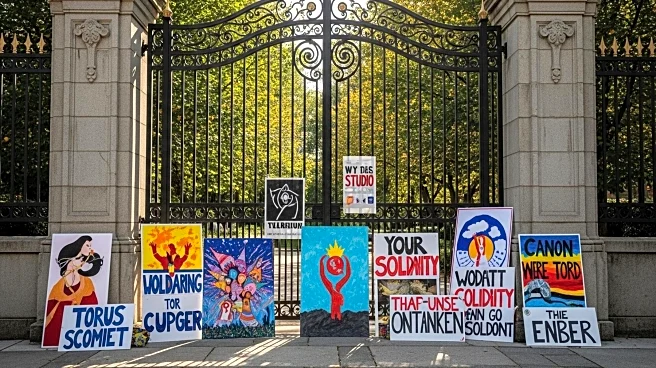What's Happening?
Protesters gathered outside Walt Disney Studios in Burbank, California, demanding the reinstatement of Jimmy Kimmel's late-night show, which was suspended by Disney-owned ABC. The suspension followed Kimmel's controversial comments regarding Charlie Kirk's alleged murderer, Tyler Robinson. The protest, attended by around 200 individuals, was organized in response to what many see as a violation of First Amendment rights. Writers Guild of America West President Meredith Stiehm and Burbank City Council member Konstantine Anthony were among those present, criticizing Disney and ABC for yielding to pressure from the Federal Communications Commission (FCC). The FCC's Chair, Brendan Carr, had previously suggested potential actions against ABC due to Kimmel's remarks.
Why It's Important?
The suspension of Jimmy Kimmel's show has sparked a debate over freedom of speech and corporate influence in media. Critics argue that the decision reflects a growing trend of censorship, particularly when political figures are involved. The incident highlights tensions between media companies and regulatory bodies, with potential implications for how content is managed and controlled. The protest underscores public concern over the erosion of free expression, which could influence future media policies and corporate decisions. Stakeholders in the entertainment industry are closely watching the situation, as it may set a precedent for handling controversial content.
What's Next?
The future of 'Jimmy Kimmel Live!' remains uncertain as discussions continue between Kimmel and Disney executives. The outcome of these talks could impact the show's return and influence how similar situations are handled in the future. The protest may prompt Disney to reconsider its decision, especially if public pressure continues to mount. Additionally, the FCC's involvement could lead to further scrutiny of media content, affecting how networks approach controversial topics. Stakeholders, including media companies and advocacy groups, are likely to engage in ongoing debates about the balance between regulation and free speech.
Beyond the Headlines
The suspension of Kimmel's show raises broader questions about the role of media in shaping public discourse and the ethical responsibilities of corporations in managing content. It also highlights the cultural divide in the U.S., where political affiliations can significantly impact media narratives. The incident may lead to increased advocacy for media freedom and discussions on the limits of corporate influence in public communication. Long-term, this could result in shifts in how media companies navigate political pressures and maintain editorial independence.










